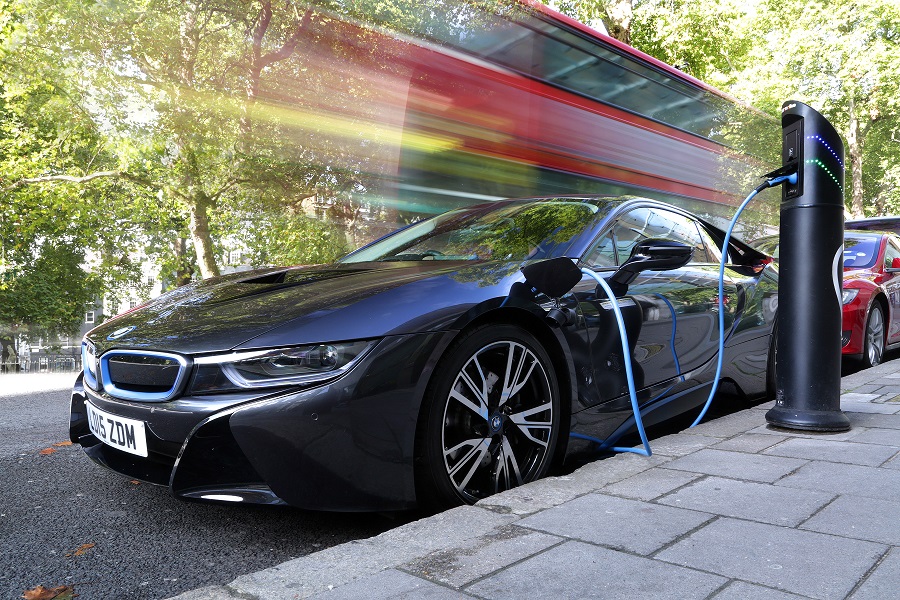London’s councils are expecting to install over 2,600 charging points across the capital in the next financial year following a call by Mayor of London Sadiq Khan and London cab drivers to install more chargers throughout the city.
Khan was speaking yesterday as he launched a new network of rapid charge points for EVs. Over the past six months Transport for London (TfL) has worked with suppliers appointed in April on the installation of 100 rapid charge points across the capital where a vehicle can be charged within half an hour.
The network includes 51 points for use by taxis and is part of the mayor’s efforts to improve London’s air quality, by helping phase out the use of diesel and encouraging the use of zero-emission vehicles.
Khan said: “The roll-out of rapid charging points marks a big step forward in the shift to zero-emission vehicles, which the capital desperately needs to clean up our toxic air. But widespread change will not happen until a sufficient charging infrastructure is in place, allowing taxi drivers, businesses and Londoners to easily make the switch.
“On my watch, TfL has already installed 100 new rapid charge points – despite only 5% of the city’s roads being under my control. However, we will only reach the numbers we need if the boroughs install these points on the 95% of the network in their control and TfL stands ready to help.
“I also urge private-sector businesses to work with us on expanding the network and help make lasting improvements to the capital’s air quality.”
General secretary of the Licensed Taxi Drivers’ Association, Steve McNamara, added: “London’s cab drivers are leading the charge in cleaning up London’s polluted air. We welcome the network of rapid electric charging points that the mayor has launched today.
“However, more needs to be done to support our hard-working drivers. Other politicians now need to get on with the job of installing more rapid electric charging points across London.”
Thousands more on the way for London
However, data released by London Councils has shown there will be at least 2,630 charging points installed by 2018/19, in addition to the 644 installed since January 2017, representing an increase of over 300%.
The charging points installed include a mixture of slow (3kWh, mainly lamp columns), fast (7-22kWh) and rapid (50kWh+) charging solutions, strategically placed to meet the demand of local areas as well as encouraging the switch to electric.
Cllr Julian Bell, London Councils’ chair of transport and environment committee, said: “These figures highlight our commitment to delivering environmentally friendly transport solutions by growing electric vehicle charging infrastructure for our residents.
“London boroughs are engaging with their communities and developing solutions tailored to local needs. It is essential we continue to do so and take people with us. London councils will continue to work with our partners in delivering a modern and environmentally sustainable capital city for the future.”
This is intended to help clean up London’s air by providing the means to replace the city’s most polluting vehicles.
As of this year no more diesel taxis are being licensed, and all taxis that are licensed for the first time need to be zero-emission capable. The mayor’s air quality plan aims to help thousands of cabbies switch to cleaner vehicles by 2020.
According to City Hall, taxis are responsible for 16% of NOx and 31% of particulate matter (PM2.5) road transport emissions in central London. A greener fleet could reduce harmful NOx emissions from taxis by 45% in central London by 2020.
Lilli Matson, Transport for London’s director of transport strategy, commented: “The installation of an extensive rapid charge point network is central to enabling cabbies to ditch their dirty diesel vehicles and replace them with green alternatives.”
The council’s plans should help to meet the expectations of Khan, McNamara and Chris Gubbey, chief executive of the London Electric Vehicle Company, who said: “We need London Boroughs to prioritise rapid-charging infrastructure which, in turn, will encourage more drivers to make the switch to zero emission capable vehicles.”
The roll-out is underway
A number of boroughs have already enacted significant and innovative electric vehicle charging programmes, with Kensington and Chelsea council recently completing central-London’s largest network of lamp post electric vehicle chargers.
This is soon to be overtaken by Wandsworth council, which has begun installing a variety of over 700 chargers across the area, including lamp posts which have had 15 EV charging plugs installed in them this week.
Transport and environment spokesman councillor Jonathan Cook said: “This is a landmark moment and demonstrates our commitment to providing the types of infrastructure that will soon be required to keep people on the move.
“Here in Wandsworth we are planning to be well ahead of the game.
“By creating such an extensive network of charging points our aim is to remove one of the biggest hurdles facing people when they begin to think about the feasibility of changing from petrol and diesel to electric.”





